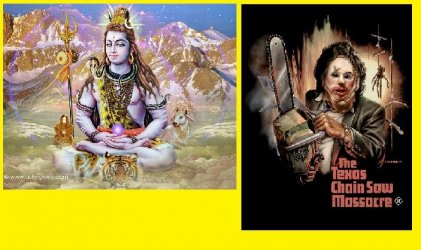- Sep 22, 2013
- 4,956
- 250
- 85
Shiva is the unusual Hindu god of destruction and meditation.
Leatherface is the fictional chainsaw-wielding cannibal from the popular Texas Chainsaw Massacre horror film franchise.
Shiva represents authority, asceticism, vanity, and self-control.
Leatherface represents mania, terror, cannibalism, and absurdism.
These two 'folk mythos' avatars have become symbolic of pedestrian rituals.
Hinduism saw a rise in popularity in America during the counter-culture movement (1960s) when the bohemian, naturalism, and expressionism of Hindu mythology was discovered to be very compatible with the free-love and egalitarian ethos of the counter-culture 'hippies.' People were experimenting with drugs, music, and religion, and liberalism-oriented Hindu avatars/deities such as Shiva (yoga merchant) and Kali (female deity symbolizing gender rage) were finding new fans among American youngsters curious about strange philosophies.
The decline of the counter-culture movement saw the rise of Charles Manson and the 'Helter-Skelter' fiasco, when bohemian liberalism was challenged by anti-social nihilism. In 1974, Tobe Hooper released his ground-breaking and heart-pounding gore-fest film The Texas Chainsaw Massacre which introduced the world to the mania of Leatherface (the chainsaw-wielding demon).
Recent films such as "American Psycho" [2000] expound on culture vertigo ideas and suggest a timeless human fascination with norm coordination.
Understanding how to compare and contrast naturalism/asceticism (i.e., Shiva) with anarchy/absurdism (i.e., Leatherface) helps us evaluate how culture symbols become colloquialized.
How can we use the application value of the folk mythos avatars Shiva and Leatherface to analyse or assess the social value of divinity-colloquialization idols such as Lucifer Morningstar (DC Comics), a comic book translation of the Christian adversary Lucifer (or Satan, the Devil)?
====
Shiva
Leatherface

Leatherface is the fictional chainsaw-wielding cannibal from the popular Texas Chainsaw Massacre horror film franchise.
Shiva represents authority, asceticism, vanity, and self-control.
Leatherface represents mania, terror, cannibalism, and absurdism.
These two 'folk mythos' avatars have become symbolic of pedestrian rituals.
Hinduism saw a rise in popularity in America during the counter-culture movement (1960s) when the bohemian, naturalism, and expressionism of Hindu mythology was discovered to be very compatible with the free-love and egalitarian ethos of the counter-culture 'hippies.' People were experimenting with drugs, music, and religion, and liberalism-oriented Hindu avatars/deities such as Shiva (yoga merchant) and Kali (female deity symbolizing gender rage) were finding new fans among American youngsters curious about strange philosophies.
The decline of the counter-culture movement saw the rise of Charles Manson and the 'Helter-Skelter' fiasco, when bohemian liberalism was challenged by anti-social nihilism. In 1974, Tobe Hooper released his ground-breaking and heart-pounding gore-fest film The Texas Chainsaw Massacre which introduced the world to the mania of Leatherface (the chainsaw-wielding demon).
Recent films such as "American Psycho" [2000] expound on culture vertigo ideas and suggest a timeless human fascination with norm coordination.
Understanding how to compare and contrast naturalism/asceticism (i.e., Shiva) with anarchy/absurdism (i.e., Leatherface) helps us evaluate how culture symbols become colloquialized.
How can we use the application value of the folk mythos avatars Shiva and Leatherface to analyse or assess the social value of divinity-colloquialization idols such as Lucifer Morningstar (DC Comics), a comic book translation of the Christian adversary Lucifer (or Satan, the Devil)?
====
Shiva
Leatherface

